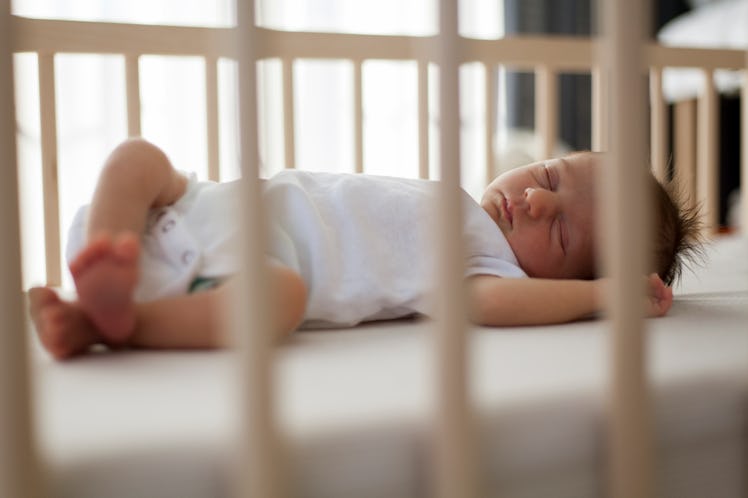How French Parents Sleep Train Their Babies With Le Pause
A more laissez-faire nighttime philosophy could help you and your baby sleep.

The French don’t necessarily sleep train their kids, but that doesn’t mean they can’t teach American parents a thing or two about getting a baby to sleep. After all, Pamela Druckerman, author of the very popular 2012 parenting book Bringing Up Bébé: One American Woman Discovers the Wisdom of French Parenting, learned plenty about helping her kid sleep from the French, using a method similar in some ways to extinction sleep training. In lieu of popular American sleep training methods, Druckerman asked French parents, who seemed to be getting plenty of sleep, to share their wisdom. All it takes, she found, is a bit of a pause.
The Le pause French baby sleep training method differs from extinction sleep training (cry it out) in the sense that the latter involves blatantly ignoring the child’s cries after they have been put to bed until they eventually fall asleep. French parents don’t race into the baby’s room at the sound of every grunt and whine during the night, according to Druckerman, but they don’t engage in cry-it-out sleep training either.
Instead, French parents wait a few minutes to see whether babies will settle on their own, a technique Druckerman calls “the pause.” They don’t just ignore their babies when they cry. They tend to listen closely to the sounds their babies make, which helps inform them about when they really need attention and when babies are just making noises in their sleep.
In other words, “Sometimes you intervene if the baby is persisting, but you’re not forcing your help on the baby at the slightest sound,” says Janet Kennedy, Ph.D., a clinical psychologist, founder of sleep-consultation service NYC Sleep Doctor, and author of The Good Sleeper: The Essential Guide to Sleep for Your Baby (and You).
Babies unable to self-soothe by 6 months old are unusual in France. In fact, some babies are sleeping through the night — known as “doing their nights” in France — as early as 2-months-old, Druckerman wrote.
This is practically unheard of in the U.S., where parents are told that generally babies aren’t capable of self-soothing until they’re at least 3-months-old. But even at 4 months and beyond — the stage many experts say is fine to start sleep training if parents want to — many American parents are still terrified they’ll inflict emotional damage on their kids if they fail to comfort them immediately at the first signs of distress or discomfort in the night.
One of the studies that stoked this fear, published in 2012, found higher levels of the stress hormone cortisol in both babies and parents of children left to “cry it out” overnight. For every study concluding that letting healthy babies cry it out is damaging, however, there’s another study countering that it’s not, says Sharon Somekh, M.D., a pediatrician in Long Island, New York.
“The pause” isn’t as extreme a sleep training method as crying it out is anyway. In fact, it has more similarities to “graduated extinction,” a sleep training method that involves waiting longer and longer intervals before going in to comfort babies when they cry.
The French sleep training method is considered easier on parents, emotionally, so it’s easier to be consistent with, and consistency is important when sleep training babies. Like every other sleep training method, it has its critics, but there’s research to support it as healthy and effective. In their study published in Pediatrics, researchers who followed up with parents when their babies were 1-year-old didn’t see significant differences in parent-child bonding or more behavioral or emotional problems between babies sleep trained with the graduated extinction method and babies whose parents used “bedtime fading,” a more attachment-style sleep training approach.
In addition to its apparent effectiveness, another appealing aspect of the French method of sleep training is that it’s easy to remember how to do it. Basically, you interfere as little as possible with your baby’s sleep and trust your instincts. With the French method or graduated extinction, babies learn how to self-soothe, which is essential for longer stretches of sleep.
But the reality is that there’s no one sleep-training method that will work for every kid. “The method I recommend parents use largely depends on what they’re capable of doing,” Somekh says. “If I see that parents can’t even let their baby cry for a second in my office, they’re not going to be able to let their baby cry for an hour at home. That’s why there are so many sleep training methods — because parents are all different, and what they can emotionally handle is different.”
In the end, the best sleep training method is going to be the one that is the best match for both parent and child.
This article was originally published on